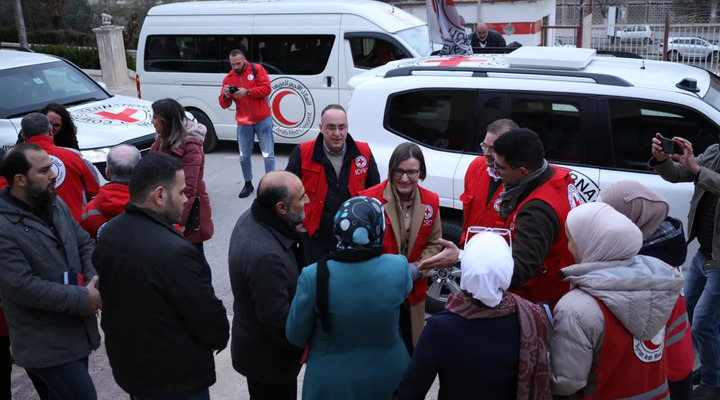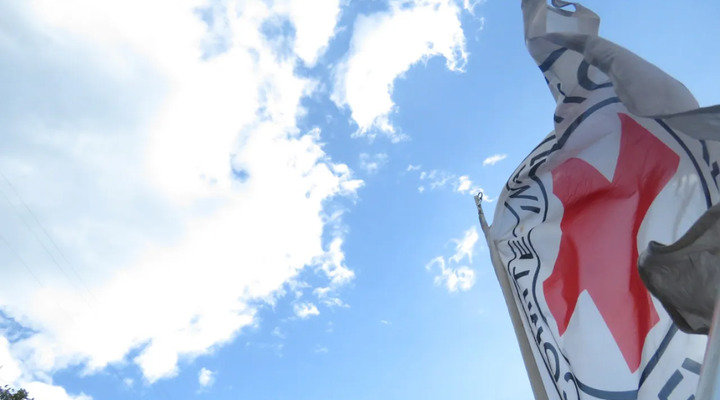Mozambique: 1 million people in conflict-affected regions receive two doses of the COVID-19 vaccine
Mozambique’s national immunization campaign has vaccinated over 1 million people -- 75% of the population -- in six districts affected by armed conflict in the provinces of Cabo Delgado, Manica, and Sofala with the support of the International Committee of the Red Cross (ICRC).
“The armed conflict in Cabo Delgado has had a real impact on the health system in general. Most health centers there have been destroyed, burned or vandalized, and access to these health centers is not possible due to the insecurity,” explains Emilio Mashant, ICRC Health coordinator in Mozambique. “The violence prevented the health system from deploying to these places to conduct a vaccination campaign against COVID.”
The ICRC supports the country’s health authorities by providing fuel to transport vaccines, healthcare teams, and Mozambiquan Red Cross volunteers in Pemba, Montepuez, and Ibo, in the Cabo Delgado Delgado province. The ongoing violence has severely impacted access to healthcare in this region, where over 3,000 families have fled their homes in search of safety since the beginning of June this year. Over the past few years, nearly 800,000 Mozambiquans have been displaced by the armed conflict in Cabo Delgado.
The ICRC provides the same assistance, as well as vehicles, in the country’s central region in the districts of Barué, Mossurize (Manica) and Gorongoza (Sofala), where the conflict of 2013-19 took a heavy toll on healthcare. Lack of access to essential services remains one of the main humanitarian issues in this part of the country.
In addition, the organization supported the work of 200 volunteers from the Mozambican Red Cross, who raise awareness among communities about the importance of vaccinations. In the central provinces of Manica and Sofala alone they reached more than 50,000 people.
For further information:
Mariana Camaroti, ICRC Maputo, +258 86 883 7981, mcamarotisilva@icrc.org
Alyona Synenko, ICRC Nairobi, +254 716 897 265, asynenko@icrc.org
SHOTLIST
Length: 01:56
Location:Machongoizana district of Mossurize province of Manica Mozambique
&
Nhacadhongo district of Gorongosa province of Manica Mozambique
Date Of Filming:21st June 2022
Copyright: ICRC access all
On Screen Credit: ICRC written or logo
00:00 --> 00:09
Various shots. Red Cross Volunteer in a moving vehicle he makes announcements on megaphone.
00:09 --> 00:14
Medium shot. Red Cross vehicles arrive at Machongoizana, province of Manica Mozambique.
00:14, --> 00:19
Medium shot. A woman seated on the ground in the village. She holds a child.
00:19 --> 00:24
Medium shot. A health professional injects a person in a room full of people.
00:24 --> 00:29
Emilio Mashant, ICRC Health coordinator for Mozambique: The armed conflict in the north of the province of Cabo del Gado
00:29 --> 00:00:33
has had a real impact on the health system in general,
00:33 --> 00:39,
and in particular, almost eight most affected districts
00:39 --> 00:47
in this districts the majority of health centres have been destroyed, burned or vandalised,
00:47--> 00:53
and the access to these health centres is not possible due to the insecurity.
00:53 --> 01:08
So this didn't give opportunity to the health system, health authorities and the health team to deploy to these places and to conduct the vaccination campaign against COVID.
01:08 --> 01:11
Medium shot. Red Cross Volunteer makes announcements on a megaphone.
01:11 --> 01:18
Long shot. Group of people in a village. A health professional is seen taking blood samples.
01:18 —>01:38
Emilio Mashant, ICRC Health coordinator for Mozambique: This is also the reason for which ICRC has decided to support the health system, in the way that we can give them the means to reach these zones and try to provide vaccination to the population.
01:38, --> 01:43
Close up shot. Hands of a health professional pouring tablets into a sachet.
Ends
For further information, please contact:
Mariana Camaroti, ICRC Maputo, +258 86 883 7981, mcamarotisilva@icrc.org
Alyona Synenko, ICRC Nairobi, +254 716 897 265, asynenko@icrc.org
Established in 1863, the ICRC operates worldwide helping people affected by conflict and armed violence and promoting the laws that protect victims of war. A neutral, independent and impartial organization, its mandate stems from the Geneva Conventions of 1949.

